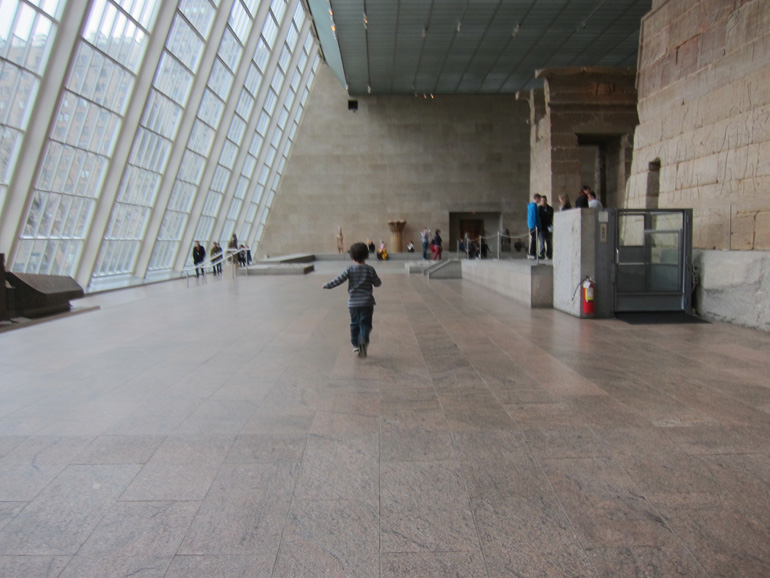Gotham Diary:
“This Is Not Good”
10 December 2012
On a rainy afternoon, there was really nowhere else to run around. So we hopped into a taxi and said that we were going to the Museum.
Sharks! Dinosaurs! Will couldn’t wait. How to break it to him, that we weren’t going to that museum?
He had not been inside the Metropolitan Museum of Art (hereinafter and always, simply, “the Museum”) in over a year — since just before our first Fire Island holiday. I can’t say how much he remembered, but I do know that he knew the way through the moon gate to the pool of koi in the Astor Court scholar’s garden. He was not as fascinated by the arms and armour as he had been, but he was thrilled by the glassed-in elevator in the American Wing. He also led us up the Louis Sullivan staircase (from the Chicago Stock Exchange). That brought us near enough to the American painting galleries to warrant a bit of fine-arts exposure: I walked him through the enfilade of galleries to Emanuel Leutze’s Washington Crossing the Delaware, where I picked him up for a better look — the better not to have to pick myself up from the utter unlikeliness of this dubious picture’s new-found power of place. Nothing else in Gallery 760 caught Will’s attention, but the seascapes by Winslow Homer, in Gallery 767, did, and it was there that we encountered some sharks after all, in Homer’s masterpiece, The Gulf Stream. I was still holding Will, and he examined the scene closely. I wondered if he shared my feeling that, even more than the broken mast, the absent rudder, or the sailor’s abstracted gaze, it is his shoelessness that signals his vulnerability to the sharks swimming around his derelict vessel. Will certainly registered the situation, though. “This is not good,” he said.
***
There was only one thing wrong with Paul Krugman’s column in today’s Times, “Robots and Robber Barons“: its date. Or perhaps it was my date. I felt as though I were reading something written ages ago. A decade, certainly.
I don’t know how much of the devaluation of labor either technology or monopoly explains, in part because there has been so little discussion of what’s going on. I think it’s fair to say that the shift of income from labor to capital has not yet made it into our national discourse.
Can that be right? It’s jarring to see that what, to me, is not only America’s but the world’s most serious problem — far more serious than the interrelated menaces (by no means slight!) of fuel exhaustion and atmospheric corruption — “has not yet made it into our national discourse.” How can I make a suggestion that we put it at the top of the list?
It is ever more obvious to me that the pace of industrial and techological development has dangerously outstripped the social imagination. Personal imaginations, especially in the graphic arts, have kept up fairly easily, but generally in individualistic, almost private ways, so that it is no surprise to find that what our more rigorous dreamers foresee is the collapse of liberal civilization into some form of dystopia. That dystopian forecast is an uncanny reflection of the current failure of social imagination, of the fact that we, the people, have no idea where we’re going, or where we want to go. Our collective, and quite unrigorous, dream entails little more than enjoying more of what there already is. Which is almost to say that we have no social dream at all, just a plethora of sloppy personal ones.
It used to be thought that work was a scourge — not unreasonably, because it by and large was. We envisioned, as recently as the immediate postwar years, a future in which work would be automated: nobody would have to do it. The fancy was too unlikely to invite scrutiny, but it isn’t anymore, and I think that we can now agree that a world without remunerated occupation would be a nightmare. Much worse than that. Â
Worry about the environment is idle and premature if we’re short on ideas about social objectives. We don’t even know how to talk about social objectives without sounding like socialists. It seems that no one can envision a future in which the organization of affairs is not imposed by blind bureaucrats. We understand almost nothing about pathologies associated with the exercise of personal power over other people — we’re just under the impression that most bosses are terrible. We do not understand the relationship between control and responsibility in business operations. And we still think that bigger is better. Raw size, mere arithmetic pile-up, continues to dazzle us. I should say that our grasp of what’s important about political economy is barely at the stage of pre-modern physicians, those quacks who believed in bloodletting.
This is not good.
Â

